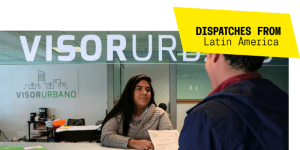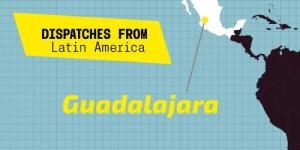Guadalajara fights corruption—and changes the way it’s being built—one click at a time

In the latest of our summer-long series checking in with the Latin American winners and finalists of the 2016 Mayors Challenge, Bloomberg Cities visits Guadalajara, Mexico to learn more about how the city is fighting corruption through its innovative permitting platform, Visor Urbano.
Para la versión en español, haga click aquí.
Urban development in Guadalajara, Mexico, used to be an exercise in endurance and, too often, futility. Entrepreneurs hoping to open a new business, architects needing to secure a permit, or residents seeking details about a building sprouting up next door had to trek to city hall and then spend hours finding the right person — or bouncing between the right people — to get answers.
And that was, typically, just the beginning of an overwrought process that could be overburdened by paperwork and, because of the multiple face-to-face interactions it required, ripe for corruption.
That’s why, as part of the 2016 Bloomberg Philanthropies Mayors Challenge, Guadalajara proposed “Visor Urbano,” its winning plan to bring transparency and expediency to the permitting process by taking key elements of it online. And it’s why, now that the platform is up and running, people in this metropolitan area of 5 million say they can’t imagine life without it.
“I don’t want to remember what it was like two years ago,” said architect and builder Benjamín Cordero Robles. “I can’t imagine going back to the old ways of working.” Diana Alfaro Patrón, a lawyer who works with builders and developers, couldn’t agree more. “The information I used to get in a week I can now get with two clicks on my phone or computer — from either my home or my office,” she said.
When someone wants to know, for example, if a building or business can be built in a certain part of town, Visor Urbano — through an algorithm — analyzes the request and provides and answer. If that answer is yes, the platform then allows users to upload required documents, make online payments, and, in a matter of minutes, print the appropriate license. It also gives residents the ability to ensure local construction projects are up to code and, when not, file a complaint with the city.
The platform has been up and running for only 20 months, but city officials report that it now takes 96 percent less time to conduct land-use procedures with the city and 80 percent and 70 percent less time, respectively, to secure building and business licenses. So far in 2019, Visor Urbano has helped issue nearly 3,000 small-business licenses and answered close to 70,000 queries. “There’s no equal tool — where you can do everything in the same place — in all of Mexico,” said Miguel Madero, manager of Visor Urbano. “It doesn’t exist.”
But Visor Urbano’s innovation extends beyond its centralization of services. It also is revolutionizing local government’s approach to transparency by giving residents the same access to records that city officials have. Last year, in fact, Visor Urbano was awarded the Transparency Innovation Award by the National Transparency Institute.
This is especially important in Mexico, where corruption-related expenses eat up 9 percent of the GDP every year, according to Transparency International, which ranks Mexico 138 of 180 countries in its Corruption Perception Index.
“In Mexico, corruption in the construction sector is very common,” explained Carlos Aguirre, president of Jalisco’s Ciudadanos por Municipios Transparentes (Citizens for Transparent Municipalities). “And that translates into badly granted licenses and, when natural disasters strike, buildings that collapse.”
Distrust of the construction sector spiked after a 2017 earthquake rocked Mexico City, causing the collapse of 38 buildings and the loss of 370 lives. “The lack of complete and timely information on the consequences of the earthquake has fueled the negative perception about the effect that corruption could have had on the collapse and damage of affected properties,” reported the organization Mexicanos Contra La Corrupción y Impunidad (Mexicans Against Corruption and Impunity) earlier this year.
Perhaps that’s why Visor Urbano is already attracting so much attention in other cities throughout Mexico and Latin America. The city has signed agreements with three Mexican cities — San Pedro Garza García, Veracruz, and Zapopan — to replicate the program. And Mexico City and municipalities in Peru and Colombia have also expressed interest.
The attention is no surprise to Guadalajara Mayor Ismael del Toro. “We all share the same problems of corruption, and disorderly growth,” he said. “The effectiveness we see in Guadalajara makes Visor Urbano attractive to other cities.”
But that effectiveness extends beyond changing the daily business of the city. “Generating transparency and trust is essential,” he added. “And Visor Urbano can be an example of total transformation — not only in urbanization but in people’s confidence in government.”
Juan Paullier is an Uruguayan freelance journalist. He worked for the BBC for almost a decade as a correspondent in Mexico, Central America, and Venezuela and also at the London and Miami offices.
Read more stories in this series:
- SANTIAGO: Why cities around the world should take notice of Santiago’s fight against childhood obesity
- ESTACIÓN CENTRAL: How one mayor and his city are tackling the immigration crisis
- ASUNCIÓN: Paraguay’s capital city takes the first steps toward counting — and including — its residents
- CURITIBA: A pioneer in busing, Curitiba now aims to improve transit options for the disabled
- BOGOTÁ: How Bogotá is making kids’ commutes safer, educational — and fun
- MEDELLÍN: How Medellín is breaking the grip of illegal lending
- GUADALAJARA: Guadalajara fights corruption — and changes the way it’s being built — one click at a time
- SÃO PAULO: As Amazon burns, São Paulo pushes sustainable agriculture



